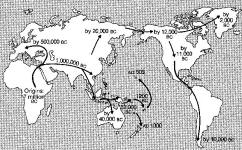|
|
biological...cultural...singularity
Unless you are a devout creationist, then you probably understand and accept basic evolution, that there is a process in nature that causes evolution. But what most of us don't notice is that evolution is an underlying mechanical aspect of the universe appears to behave like fractals creating order out of what appears to be the chaotic nature of matter. We humans are the strangest of all the living things of the universe... because we alone create culture, society, and particularly advanced thought and technology. For millions of years, we have been motivated to participate in this human evolution and history. The same motivations that have driven us for millions of years do so today. Economics in the classical sense should be first a study of our motivations and then a study of the modeling of engines of large and small scale that best deliver to these motivations or demands. Sometimes we can't see the forest for the trees. You may accept that a baby evolves into adulthood, and that who we were 1 million years ago is different than what we are today. Just as who we were 1000 years ago is different than what we are today. We can mostly all accept that things change, that we envision a future and recall a past, and believe our actions have an effect on tomorrow. The first example of life on this planet was 3.2 billion years ago. The first sexual reproduction was 900 million years ago. Dinosaurs were about 200 million years ago. We humans show up about 3.7 million years ago. About 2 million years ago we developed tools. 100 years ago migrate from Africa and populate the world. 10 to 13 thousand years ago organized civilizations begin. From that point, biological evolution is no longer the underlying change that is evident. About 2 million years ago we developed tools. We migrate from Africa and populate the world. We develop our first languages and civilizations. Biological evolution gives way to a new paradigm of change, a cultural and scientific evolution. Especially in the past 300 years where change has been so dramatic. There was once a term "renaissance man" used to describe someone well versed in many subjects. Someone who could write, play music, build a house, hunt, and sport. A man that knew and could do about 90% of the accepted knowledge at the time. Today, it is virtually impossible to know anywhere close to a majority percentile of all there is to know. If you understand the principal of a Turring machine you will notice that this recent expansion of information acts like a Turring machine in reverse. We are creating a maze of knowledge and economic complexity that we will individually never decipher. (see CHAOS) The subject of a technological singularity is no longer an abstract concept. The possibility that we may create intelligence that would be able to understand 90% of all knowing. We need to place some attention to this possibility and what it could imply to our existence. A stranger concept, in this evolution from past to the future, is that we could be only slavish witnesses to this event. That in this evolution, these economics we actually have no free will. But this takes me off topic and presents a very strange problem, but it is a question for Physics and Philosophy and not evolution. (see block universe)
EVOLUTION
 Jared Diamond germs guns and steel Singularity... Artificial Intelligence ? he Singularity Is Near: When Humans Transcend Biology: Ray Kurzweil: Books ... Singularity Is Near: When Humans Transcend Biology
Fractal Evolution: Alan Steinfeld interviews Bruce Lipton
Flagellum
The biology of starting life
<> |